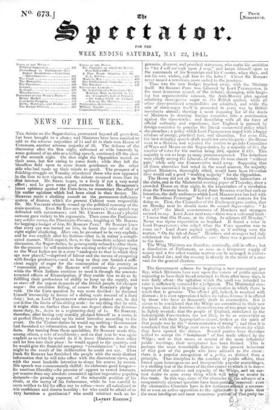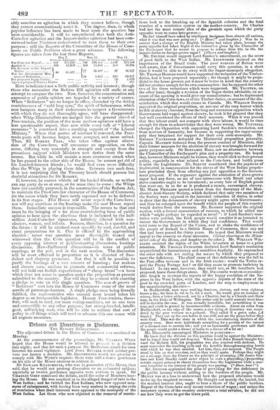The Government scheme for beginning a new commercial po- licy,
which Ministers have cast upon the waters of public opinion expecting to have their bread returned to them after many days, is now fairly afloat : the agitation which the spell was intended to raise is sufficiently matured for a judgment. The Ministerial stra- tagem has succeeded in producing a commotion in which there is much that is genuine. The offered gift, indeed, is received with distrust ; it is even appreciated below its value, because it is offered by those who have so frequently dealt in counterfeits. But it seems to be considered that the Whigs are committed to their new doctrines; that the doctrines themselves-are of too great weight to be lightly treated; that the people of England, stimulated by the indefatigable Free-traders, are not likely to be so subservient as the Irish with their Appropriation-clause, broken as the spirit of that people was by the " seven centuries of wrong"; and thus it is concluded that the Whigs nzust move on with the stream for which they have opened the sluices. Several parties have therefore united to accept the " instalment" of free trade offered by the Whigs ; and to that sense, at several of the most influential public meetings, their acceptance has been limited. This is perhaps the most remarkable feature in the present behaviour of that part of the people who have adhered to the cause : there is a popular recognition of a policy as distinct from a principle. That discipline in the conduct of public affairs, thus forced upon heterogeneous and irresponsible popular assemblages, is a striking test of the forces of the two causes to which it is due— mistrust of the motives and capacity of the Whigs d-an, ear- nest desire to seize every thing which will bei us nearer-to
free trade. In this way, some of the obstacles to• he advance of a comparatively abstract question have been partita removed : even the obstructive Chartists have in few instances ful or even an active opposition to the agitationfr the most intelligent and most numerous portioitco ft success- - s plain that -3 t.party ta-
citly sanction an agitation in which they cannot believe, though they cannot conscientiously resist it. The degree, then, to which popular influence has been made to bear upon the question has been considerable. It will be remembered that both the Anti- Corn-law agitation and the Import-duties agitation had been com- menced before. Ministers endeavoured to turn them to their own purpose : still the Reports of the Committee of the House of Com- mons on Public Petitions show a great advance. The following figures are taken from the last three Reports. Max 7. May 11. May 14.
Petitions. bignatures. Petiti. no. Signatures. Petitions. Signatures.
For Corn-lass Repeal.. 344 126,755 ... 748 304.4::0 ... 1,507 474,448 Against it 225 13.519 ... 409 21,845 ... 540 30,934 For Revision of the Import-
Duties 80 31,462 ... 77 35.402 87 36.957 For the Government Men-
cures of Reduction 18 1.832 ... 296 68,617
For proposed Sugar-Duties — — — — ... 20 1.628
Against proposed Timber-Duties 161
Here is indicated not a little public activity and interest ; though those who remember the Reform Bill agitation will smile at any attempt to compare the two. Now, however, the concentration and expression of public opinion are impeded by a variety of causes. When " Reformers" are no longer in office, shrouded by the doting reminiscences of " auld lang syne," the spirit of forbearance, which now hampers many in their endeavours to support a Government with which they do not thoroughly agree, will have disappeared : when Whig-Ministerialists are merged into the general crowd of Free-traders, the position of the more zealous agitators will have a less questionable aspect, than now while every talk of " Liberal measures " is construed into a sneaking support of " the Liberal Ministry." When that source of mistrust is removed, the Free- trade party will become larger, more compact, and more united. Thus, Sir ROBERT PEEL, who takes office against altera- tion of the Corn-laws, will encounter an opposition, on that score, differing very materially in strength and energy from the precarious support which Ministers now derive from the same source. But while he will sustain a more strenuous attack when be has passed to the other side of the House, he cannot get rid of his Landed-interest friends ; he would find even more difficulty than the Whigs in playing them false. Between two such fires, it is not surprising that the Treasury bench should possess but doubtful attractions for Sir ROBERT.
If, however, he cannot whistle off his landed friends, so neither can any party do so at once, or for some time to come : the Whigs have too carefully prepared, in the construction of the Reform Act, to maintain the Pro-Corn-law character of the House of Commons, for the cause which they have newly espoused not to be defeated in its first stages. This House will never repeal the Corn-laws ; nor will any exertions at the hustings make the next House repeal them. Immediate success is impossible. The means to that end must be the bringing of a far more overwhelming force of public opinion to bear upon the elections than is indicated by the half- million Anti-Corn-law signatures, infinitely diluted with non- electors, women, and infants. Success, therefore, is a question for the future : it will be attained most speedily by cool, careful, and exact preparations for it. One is offered by the approaching election : never was question more thoroughly teazed and winnowed than the Corn question will be in the conflict of every opposing interest at public-meeting discussions, hustings discussions, New-Parliament discussions—in votes at public meetings, at the poll, and in the next session. The discussion will be most effectual in proportion as it is divested of frau- dulent and claptrap pretences. Not that it will be possible to purify the hustings of a vast amount of humbug ; but zealous and sincere men, anxious to promote real commercial reforms, will not hold out foolish expectations of " cheap bread "—a boon which does not come in question under the proposition at present submitted to the country. Nor will they be content with exacting a pledge to vote on this single question. The nom de guerre of " Reformer" sent into the House of Commons some of the most servile of patronage-hunters. A single pledge once being literally fulfilled, the representative who seemed most bound takes his degree as an irresponsible legislator. Honest Free 'traders, there- fore, will seek to send, not mere voting-machines, set to one tune and convertible to any other purpose, but strong-headed, intelli- gent, self-relying men, who will be able to enforce that sort of policy in all things which will tend to advance this one cause with all cognate measures.



























